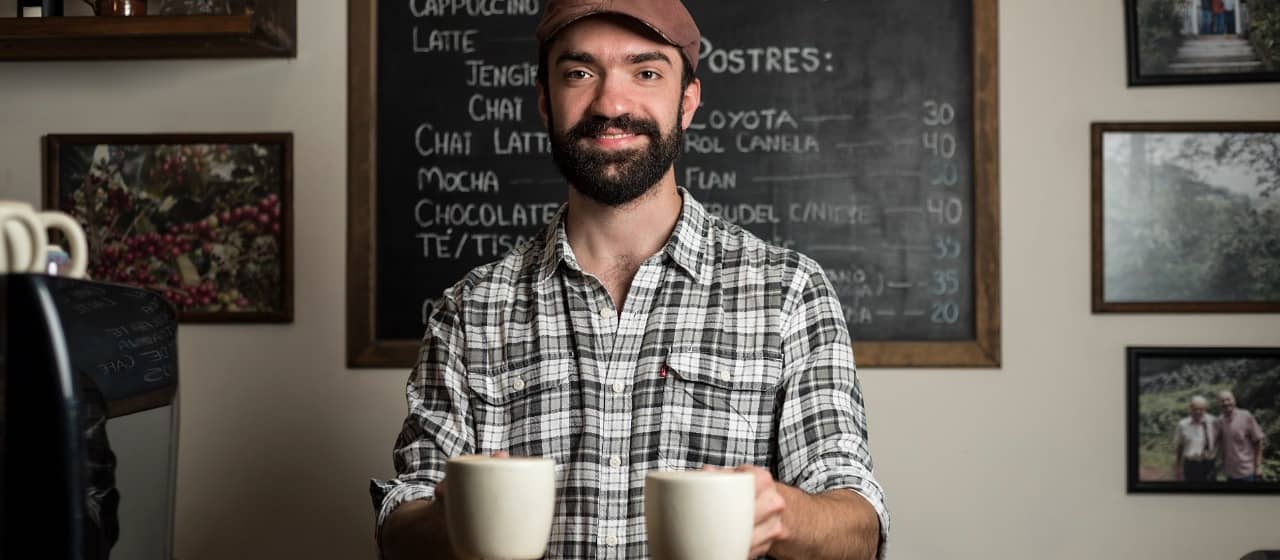“What I mostly enjoy about working with coffee is that I get to meet interesting, dedicated and working people. I also love the local coffee shop community that naturally (and historically) forms in every big city around the world.”

Daniel and his father
“My father and I opened Oro Maya Coffee 6 years ago in Guadalajara, Mexico. I didn’t know anything about coffee; I was studying environmental engineering but seeing my father work with coffee inspired me to join him. All the projects that my school would leave me I based them off of coffee plantations and the culture surrounding coffee. I loved it so much that I went to Nicaragua to a self-sustainable coffee plantation to work. I learned about the history of coffee and worked closely with farmers to learn the environmental impact coffee has on earth. I also had the privilege to learn about coffee cupping, roasting, and coffee growing as well. When I came back to Guadalajara, my dad and I opened what is now Oro Maya’s coffee shop.”
Now, besides having a Bachelor’s Degree in Environmental Engineering, Daniel is also studying an MBA based on local social empowerment and direct-trade practices. “Fortunately, I had several opportunities to work on sustainable coffee farms. Having the possibility to get to know coffee-producing families directly, to talk about their worries, their quality of life, and their objectives are part of the heart that is Oro Maya.”
Daniel loves everything that involves growing coffee in a sustainable way. The environmental impact of coffee is enormous, there is a lot of soil erosion, and a lot of water is being wasted specially when washing coffee. When he started noticing this, something within him grew, and he wanted to start promoting a coffee that had a fantastic quality but was also kind to the earth.
For something to be sustainable, it has to encompass these three concepts: social, economic, and ecologic. If these three concepts don’t work in harmony, there isn’t a sustainable process.

Daniel Tessier
“We sometimes forget that sustainability not only encompasses ecology, environment and/or nature, but also an economic and social context so as to correctly work. We can’t have sustainable, feasible agronomic practices without considering if a project is financially healthy (or supported) and all the hands that are involved in the process have an ethical and humane quality of life. We can only reach sustainability if all of these three aspects are being constantly covered.”
Daniel explains.
The coffee that both Daniel’s father and son use in Oro Maya has organic certification, one that Finca Irlanda (the coffee plantation they work with) has had since 1967 with the Peters family. Back in the day, there was no interest in an organic certification like there is nowadays; however, Walter Peters did it out of ecological philanthropy. Walter stands behind creating a community that lives out of what they produce. Currently, only around 5% of all Mexican coffee producers follow an organic certification program or implement sustainable/social practices; but that percentage has grown from year to year.
“I agree 100% that coffee is all about community, and we focus every day to share that knowledge from Seed to Cup with our final customers. I consider myself to be very optimistic and hope to see a 100% sustainable coffee-producing country in the near future.”
Being part of the coffee culture in Mexico made Daniel realize a lot of things. Almost all specialty coffee beans are exported out of their original countries. The main reason is the price and willingness-to-pay of foreign customers, as in the case of the US and Europe. Who can blame a national micro-producer who exports most of her/his beans if the final client is willing to pay twice the price of a local roaster or broker? Unfortunately, there is almost a rule that you won’t find good-quality coffee beans in a coffee-producing area.
“I’ve learned that coffee has an identity not only related to gastronomy but to an environmental, economic and social background that needs to be addressed to invest in positive, sustainable coffee-production practices.” Daniel’s favorite coffee method is the Chemex because it lets you “see” and taste what’s behind a coffee bean. He also says that his guilty pleasure of his is a traditional Café de Olla with lots of cinnamon, raw cane sugar, and orange peel.
“What I most enjoy about working with coffee is that I get to meet interesting, dedicated, and working people. I also love the local coffee shop community that naturally (and historically) forms in every big city around the world.”
Oro Maya, located in Av. Guadalupe #114 in Guadalajara, Mexico, will always have one of the owners welcoming you to the coffee shop. “Whenever you visit Oro Maya, there will always be one of us here, someone that can talk to you about the coffee process, where it comes from, and how it’s grown. Customers feel like they are in Chiapas, surrounded by a family atmosphere. That is what we strive to maintain.”
The form you have selected does not exist.
